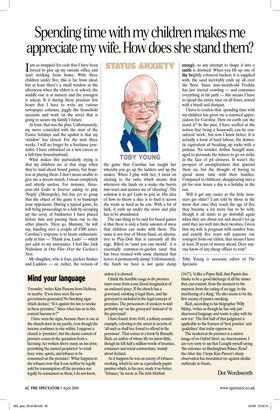Mind your language
‘I wonder,’ writes Kim Parsons from Helston, or nearby, ‘if you have seen the new government-generated No Smoking signs which declare: “It is against the law to smoke in these premises.” Since when has on in this context become in?”I have seen the signs, because there is one at the church door in my parish, even though the incense continues to rise within. I suppose a church is ‘premises’, but the classic context of premises comes in the quotation from a licensing Act written above many an inn door, permitting the named proprietor ‘to retail beer, wine, spirits, and tobacco to be consumed on the premises’. What happens to the tobacco now that it can neither be legally sold for consumption off the premises nor legally be consumed on them, I do not know, unless it is chewed.
I think the horrible usage in the premises must come from some literal imagination of an enclosed space. If the church has a graveyard, smoking is legal there, and the graveyard is included in the legal concept of premises. The persecutors of smokers would probably say ‘on the graveyard’ instead of ‘in the graveyard’.
I have found, from 1610, a solitary counterexample, referring to the arrest in taverns of ‘all such as shall bee found to offend in the premisses’. That comes in a book by Barnaby Rich, an author of whose life we know little, though he left half a million words of treatises, romances and social commentary, mainly about Ireland.
As it happens he was an enemy of tobaccosmoking, which he saw as a peculiarly papist pastime which, in his eyes, made it no better. ‘Tobacco,’ he wrote in The Irish Hubbub (1617), ‘is like a Popes Bull, that Papists doe thinke to be a good discharge of all the sinnes they can commit, from the meanest to the maynest, from the eating of an egge, to the murthering of a King.’ He also seems to be the first enemy of passive smoking.
Rich, according to his biographer Willy Maley, ‘writes as though he has only just discovered language and wants to play with his new toy’. The first half of that judgment is applicable to the framers of ‘best practice’ and ‘guidelines’ that today oppress us.
The modern in the premises is a mirror image of on Oxford Street, an Americanism. I am very sorry to say that I caught myself saying ‘the entrance on Buckingham Palace Road’ the other day. I hope Kim Parson’s sharp observation has inoculated me against similar outbreaks in future.
Dot Wordsworth


































































 Previous page
Previous page